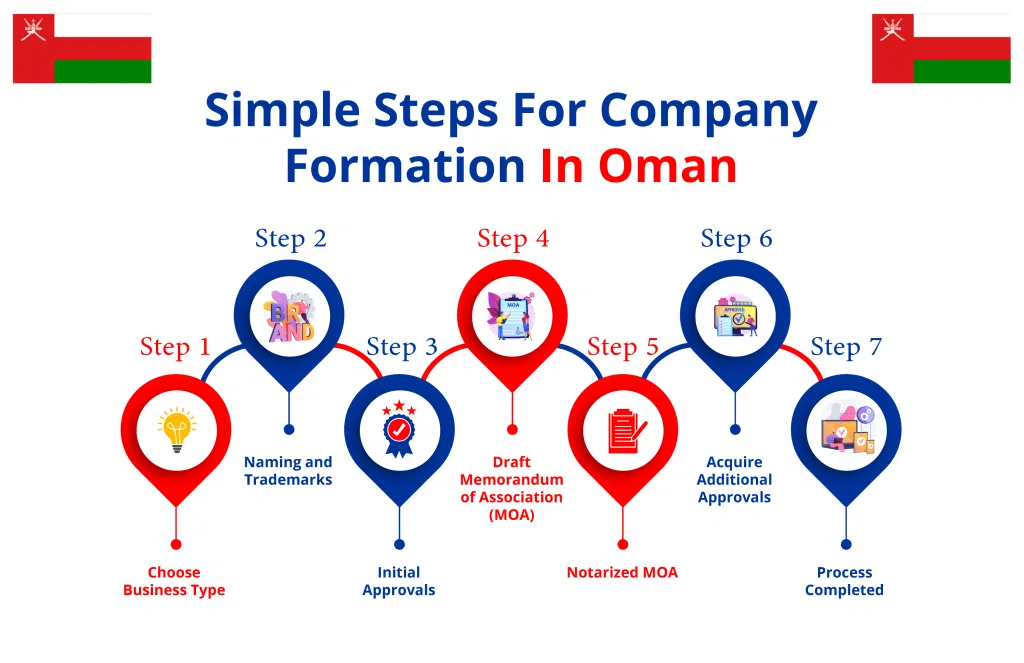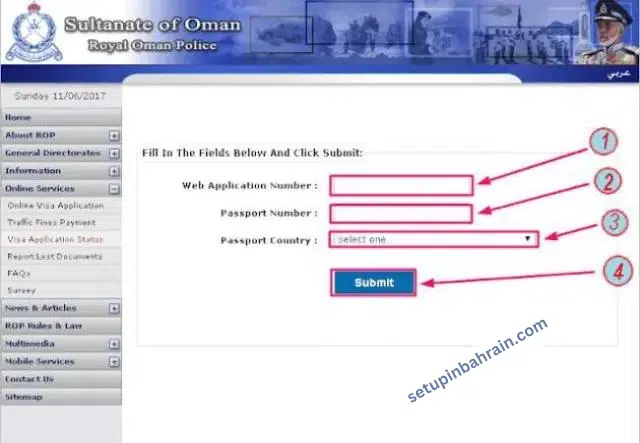Register Company in Oman
Register Company in Oman with 7 Easy Steps:

- Choose Type of Business: The first pivotal move to register company in Oman is the deliberate selection of a suitable business structure, such as a sole proprietorship, partnership, With Limited Liability (WLL), or joint stock company, tailored to match your specific objectives and operational needs.
- Naming & Trademarks: The next vital stage is to register a distinct and compliant company name with Oman’s Ministry of Commerce, Industry, Investment and Promotion (MOCIIP), ensuring it meets the country’s naming guidelines while being unique and identifiable for your business.
- Concerned Departments Approvals: During the third phase of establishing a company in Oman, businesses pursue initial approvals from essential government departments such as the Ministry of Commerce, Royal Oman Police, and the Municipality. These approvals authenticate proposed business activities, verify personnel credibility, and ensure adherence to local regulations, laying the legal groundwork for business operations.
- Draft the MOA: In the fourth phase of setting up a company in Oman, the focus shifts to drafting the Memorandum of Association (MOA). This critical document outlines essential aspects such as the company’s objectives, structure, and operational guidelines. Serving as a foundational document, the MOA defines the framework within which the company operates. It’s pivotal to craft a detailed and accurate MOA as it forms the legal cornerstone for the company’s establishment and operations in Oman.
- Notarization of MOA: During the fifth stage of establishing a company in Oman, the Memorandum of Association (MOA) undergoes notarization. This essential step involves having the MOA authenticated by a notary public or a legal authority. Notarizing the MOA serves to validate its legitimacy and confirms its legal standing. It attests that the document has been verified, signed by authorized individuals, and complies with Oman’s legal mandates, reinforcing the company’s formal establishment process.
- Open a Corporate Bank Account: During the sixth phase of establishing a company in Oman, the focus turns to setting up a corporate bank account. This step involves selecting a bank and starting the process of creating a dedicated account for the business. This account allows the company to handle financial transactions, receive payments, and manage various financial activities related to its operations. It’s a critical tool for separating personal and business finances, ensuring transparent and efficient financial management. Creating a corporate bank account is vital for meeting regulatory standards and ensuring the smooth functioning of the business in Oman.
- On Completion: After completing the company formation process in Oman, businesses should focus on commencing operations, registering for taxes, obtaining necessary permits, adhering to labor laws when hiring, maintaining regulatory compliance, implementing corporate governance, and planning for future growth and modifications. Adhering to regulations, ethical practices, and adaptability are crucial for sustained success in Oman’s business landscape after company formation.
Now let's explore every step to register company in Oman.
First of all, choose the company type that best suits your business activity :-
Initiating the process to register company in Oman demands a crucial decision-making phase: selecting the appropriate company type aligning with your business goals. This fundamental choice encompasses options like a Limited Liability Company (LLC), Joint Stock Company (SAOC), Branch Office, or Representative Office. Each option delineates unique ownership structures, liability considerations, and operational scopes.
For example, when you register company in Oman as an LLC, it offers both flexibility and limited liability, making it an apt choice for small to medium-sized enterprises. Conversely, registering an SAOC involves public subscription, typically favoring larger businesses aiming to offer shares to the public.
A Branch Office facilitates seamless business expansion, functioning as an extension of the parent company and maintaining a unified legal structure. Conversely, a Representative Office centers on market research and advocates the parent company’s interests without engaging in direct commercial activities.
The selection of the company type pivots on various factors: the nature of your business, its scale, growth aspirations, and the desired level of autonomy and liability. This crucial choice profoundly shapes subsequent steps in the process to register company in Oman, influencing regulatory compliance, ownership arrangements, and operational guidelines.
Now you need to reserve the Business Name :-
To successfully register company in Oman, one of the primary and critical steps is the reservation of a business name. This step involves selecting a unique and compliant name that’s available for use without conflicting with existing businesses.
The process begins with the submission of an application to the Ministry of Commerce, Industry, and Investment Promotion specifically to register company in Oman. This comprehensive application includes the desired business name, the chosen type of company, proposed business activities, and shareholder details.
Authorities meticulously review each application to ensure the availability and compliance of the name according to Oman’s naming regulations. This stringent scrutiny is in place to prevent the registration of any name that is identical or misleadingly similar.
Once the application is approved, the reserved name is exclusively allocated to the applicant for a specified duration. This exclusive reservation ensures the readiness of the name for the formal process of establishing the company, providing both legal protection and a distinct identity in the Omani market.”
The next step will be drafting of the MOA :-
The drafting of the Memorandum of Association (MOA) holds immense significance in the establishment of a company in Oman, specifically when it comes to registering a company in Oman. This document serves as a foundational guide, detailing essential aspects that define the company’s structure, purpose, and operational guidelines related to how to register company in Oman.
Initiating this process involves meticulously formulating the MOA in adherence to Oman’s legal requirements and the chosen company structure to register company in Oman. The MOA typically includes critical details such as the company’s name, objectives, intended business activities, registered office address, share capital specifics, shareholder information, and proposed management structure to register company in Oman.
The precision and clarity of the MOA are crucial, as it sets the groundwork for the company’s operations and its relationships with stakeholders when you register a company in Oman. This document delineates the company’s scope, duties, and responsibilities, providing a framework for internal operations and external engagements with shareholders and other entities when registering a company in Oman.
Developing a robust MOA requires careful attention to detail, ensuring alignment with legal standards and compliance with Oman’s corporate regulations. The comprehensiveness and accuracy of the MOA play a pivotal role in establishing a firm legal framework for the company’s activities and engagements within Oman’s business landscape when you go to register company in Oman.
Moving to the Notarization of the MOA :-
The notarization of the Memorandum of Association (MOA) is a pivotal step in establishing a company in Oman. This process involves verifying the authenticity and legality of the MOA through formal certification by a notary public or a legal authority.
This stage begins once the MOA is prepared in adherence to Oman’s legal requirements. The document is then submitted to a notary public, who scrutinizes its content, authenticity, and the identities of the signatories.
The notary public meticulously examines the MOA to ensure it complies with legal standards, contains accurate information, and meets regulatory criteria. This scrutiny aims to prevent any inconsistencies, inaccuracies, or fraudulent elements within the document.
Upon confirming compliance and accuracy, the notary public officially certifies the MOA by affixing their seal or signature. This certification confirms the document’s validity and legality, signifying that it has undergone thorough verification by a legal authority.
Notarization acts as a safeguard, assuring stakeholders and regulatory bodies of the document’s authenticity and compliance with legal requirements. It reinforces the MOA’s legal standing, ensuring its credibility and legitimacy within Oman’s legal framework.



Now the 6th step of Corporate Bank Account :-
Having a corporate bank account is typically an essential step in the company formation process. It allows businesses to manage financial transactions, receive payments, pay expenses, and conduct various financial activities related to their operations.
When setting up a company, establishing a corporate bank account is crucial for several reasons:
Legal Compliance: Many jurisdictions require companies to have a dedicated bank account for their business transactions to comply with financial regulations.
Financial Operations: A corporate bank account separates personal and business finances, facilitating better financial management, tracking of expenses, and financial reporting.
Payment Processing: It enables businesses to receive payments from clients, customers, or partners, streamlining the revenue collection process.
Employee Payroll: A corporate bank account allows for the disbursement of salaries and wages to employees, ensuring efficient payroll management.
Investor Transactions: It provides a platform for handling investment-related transactions, if applicable, for the company’s growth and expansion.
While it’s a crucial step in the company formation process, specific requirements for opening a corporate bank account can vary based on the jurisdiction and the bank’s policies. Companies usually need to provide relevant incorporation documents, identification information, and may have to fulfill additional criteria depending on the bank’s procedures and local regulations.
Important Things After Registration:
In the final step of company formation in Oman, once all the necessary approvals, documentation, and formalities have been completed, the process is officially concluded. At this stage, businesses need to focus on several essential post-incorporation tasks to ensure smooth operations:
1. Commencement of Operations: After completion, businesses can start their planned operations as outlined in the approved Memorandum of Association (MOA).
2. Tax Registration: Registering for taxes with the relevant authorities is essential for compliance with Oman’s tax regulations.
3. Obtaining Licenses and Permits: Depending on the nature of the business, securing additional licenses or permits may be necessary to operate legally in specific industries.
4. Hiring Employees: If hiring staff, businesses need to adhere to labor laws, including employment contracts, visa arrangements, and compliance with labor regulations.
5. Compliance and Reporting: Ensuring ongoing compliance with local regulations, filing annual reports, and maintaining accurate financial records are essential for business sustainability.
6. Corporate Governance: Implementing corporate governance practices helps ensure transparency, accountability, and ethical business conduct.
7. Business Expansion: Planning for future growth, expansion, or modifications to the business model is crucial for long-term success.
Post-incorporation, maintaining regulatory compliance, financial transparency, and ethical business practices are critical for sustained operations and growth in Oman’s business landscape. Regular reviews and adaptations to changing regulations and market dynamics are key to thriving in the Omani business environment.
This hCard created with the hCard creator.
It takes 10-15 business days to register company in Oman.
Foreign ownership is allowed. In some cases, restrictions may apply to foreign ownership, varying by industry and business activity.
We recommend minimum 1000 OMR.
Commonly required documents include passport copies, proposed business plans, lease agreements, and relevant incorporation forms.
Non-residents can start a business in Oman, often requiring local sponsors or partners.
Some business types might require local sponsors or partners, especially in specific industries.
Changes to business activities or structure post-formation may involve legal procedures and approvals.
Oman offers incentives or benefits in certain sectors to encourage investment and growth.
